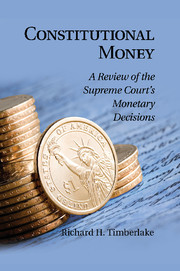Description
Constitutional Money
A Review of the Supreme Court's Monetary Decisions
Author: Timberlake Richard H.
This book analyzes nine Supreme Court decisions that dealt primarily with money, monetary events and monetary policy.
Language: English
Subject for Constitutional Money:
Approximative price 34.17 €
In Print (Delivery period: 14 days).
Add to cart
Constitutional Money
Publication date: 11-2014
Support: Print on demand
Publication date: 11-2014
Support: Print on demand
Approximative price 90.80 €
In Print (Delivery period: 14 days).
Add to cart
Constitutional Money
Publication date: 04-2013
257 p. · 15.7x23.5 cm · Hardback
Publication date: 04-2013
257 p. · 15.7x23.5 cm · Hardback
Description
/li>Contents
/li>Biography
/li>
This book reviews nine Supreme Court cases and decisions that dealt with monetary laws and gives a summary history of monetary events and policies as they were affected by the Court's decisions. Several cases and decisions had notable consequences on the monetary history of the United States, some of which were blatant misjudgments stimulated by political pressures. The cases included in this book begin with McCulloch v. Maryland in 1819 and end with the Gold Clause Cases in 1934?5. Constitutional Money examines three institutions that were prominent in these decisions: the Supreme Court, the gold standard and the Federal Reserve System. The final chapter describes the adjustments necessary to return to a gold standard and briefly examines the constitutional alternatives.
1. The current state of monetary affairs in the United States; 2. Emergence of money in civilized societies; 3. Bimetallic monetary systems and appearance of a national bank; 4. McCulloch v. Maryland, 1819, and the Second Bank of the United States; 5. 'To coin money and regulate the value thereof'; 6. Craig v. Missouri, 1830; 7. Briscoe v. Bank of Kentucky, 1837; 8. Government issues of treasury notes and greenbacks; 9. Track of the legal tender bills through Congress, 1862–3; 10. Bronson v. Rodes, 1868; 11. Veazie Bank v. Fenno, 1869; 12. Hepburn v. Griswold, 1870: the legal tender issue; 13. Knox v. Lee and Parker v. Davis, 1871: reversal of Hepburn; 14. Monetary affairs in the United States, 1871–83; 15. Juilliard v. Greenman, 1884: the final legal tender decision; 16. Judicial commentaries on the legal tender cases: sovereignty; 17. Other commentaries on the legal tender cases; 18. The [Gold] Currency Act of 1900: monetary affairs in the United States before 1914; 19. The Federal Reserve System, 1914–29; 20. The great monetary contraction, 1929–33; 21. Gold! Where was it? What happened to it?; 22. The Gold Clause Cases, 1934–5; 23. Gold and money in the twentieth century; 24. A Constitutional monetary system.
Richard H. Timberlake is an Emeritus Professor of Economics at the University of Georgia and an adjunct scholar at the Cato Institute. His research specialties are monetary policy and the history of central banking. Dr Timberlake's most recent publications include Monetary Policy in the United States: An Institutional and Intellectual History and Money and the Nation State, with Kevin Dowd. He received his PhD from the University of Chicago.
© 2024 LAVOISIER S.A.S.
These books may interest you

The Spirit of the ConstitutionJohn Marshall and the 200-Year Odyssey of McCulloch v. Maryland 43.23 €

The Wyoming State Constitution 232.03 €

